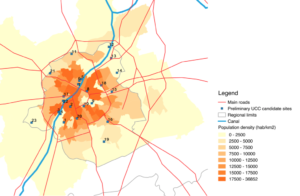Urban consolidation centres (UCC) are a popular measure in city logistics, which aims at rationalizing delivery trips in an urban area. However, although their environmental benefits have been extensively addressed and documented, many of the implementation cases fail to reach sufficient participation and demonstrate a viable business model. Milena Janjevic from Université Libre de Bruxelles did research on the feasibility of UCC’s in Brussels (B) in 2016.
Some of the main barriers linked to their implementation are the financial concerns and the stakeholder acceptance. Consequently, the success of these schemes has often been subject to a strong regulatory and financial support from public authorities. Recently, new forms of urban consolidation centre operating models offering a range of value-added activities have appeared, allowing a better integration of these facilities in the overall supply chain. Furthermore, a large number of recent experiments focus on small-scale freight consolidation, relaxing the requirements for material and human resources. The objective of this thesis is to investigate the potential of urban freight consolidation platforms to decrease the costs and improve the performance of urban logistics chains. In particular, the thesis will address factors that influence the viability of these schemes in a framework of market economy.
The report is structured around three research questions that address (1) the viability of the traditional urban consolidation centre model based on transhipment and consolidation activities (2) the impact of market-based accompanying measures for urban consolidation centre project implementation and the resulting level of stakeholder support and (3) the impact of new approaches in urban freight consolidation platforms and in particular those of new urban consolidation centres operating models and micro-consolidation platforms.

By tackling these aspects, the thesis demonstrates that the traditional urban consolidation centre model can present a viable alternative but that the success of the scheme is subject to a large number of requirements that are often difficult to meet in practice. The thesis highlights accompanying measures that can both increase the expected participation in the consolidation scheme as well as the stakeholder acceptance of the scheme, and those that meet a less positive stakeholder response. Finally, the thesis identifies the potential benefits of new operating models of urban consolidation centres and of small-scale consolidation.
The thesis offers important insights into volumes, the characteristics of goods flows and cost models of UCC’s.
